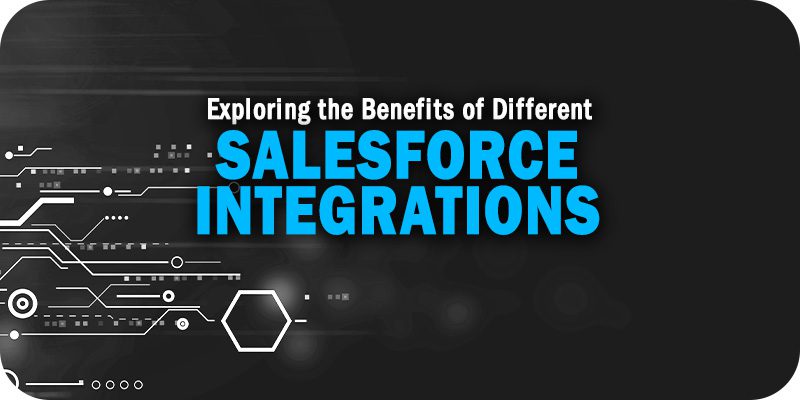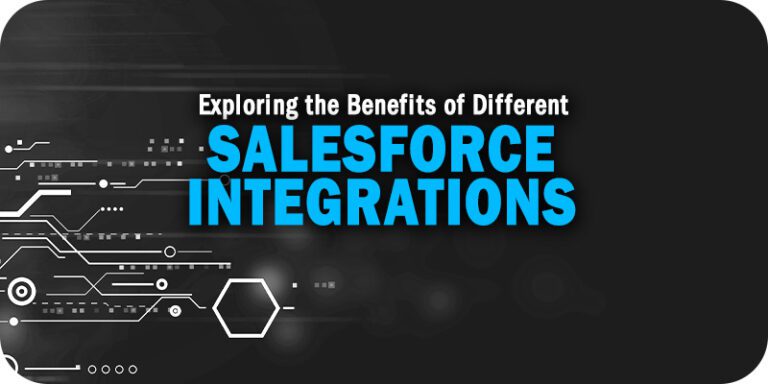Exploring the Benefits of Different Salesforce Integrations

As part of Solutions Review’s Contributed Content Series—a collection of articles written by industry thought leaders in maturing software categories—Deepa Chauhan, a Content Marketing Specialist at TechForce Services, outlines some of the benefits companies can get from Salesforce integrations.
Salesforce is a preeminent customer relationship management (CRM) platform, empowering businesses with streamlined operations, elevated customer interactions, and unprecedented growth opportunities. Although Salesforce provides a comprehensive array of functionalities, its full potential is harnessed when integrated with diverse third-party systems. Through seamless integration with other applications and platforms, businesses can unlock a realm of expanded capabilities, process automation, and profound data insights, propelling them to new heights of success.
What is a Salesforce Integration?
Salesforce integration service is all about merging the power of Salesforce with other applications to create a seamless and unified user experience. By integrating these platforms, you can provide your teams with comprehensive features that cater to both systems. When you decide to integrate Salesforce into your existing ecosystem or enhance your Salesforce-powered CRM with additional functionality, one of the critical challenges is effectively combining data between the two platforms. Without integration, you may find yourself switching back and forth between different data sets while working on specific tasks.
Types of Salesforce Integrations
Data Integrations
Data integrations involve connecting Salesforce with other systems to facilitate the exchange of information. Whether integrating with an enterprise resource planning (ERP) system, marketing automation software, or a data warehouse, data integrations provide a holistic view of customer data, enhance data accuracy, and eliminate data silos. Businesses can track customer interactions and personalize marketing efforts by consolidating data from multiple sources into Salesforce.
Application Integrations
Application integrations enable seamless connectivity between Salesforce and external applications, such as email clients, document management systems, or collaboration tools. These integrations allow users to access and update data from within Salesforce, eliminating the need for manual data entry or switching between multiple systems. For example, integrating Salesforce with an email client like Microsoft Outlook or Gmail lets users view and manage customer communications directly within the CRM.
Custom Integrations
Custom integrations involve developing tailored solutions to meet specific business requirements. This could include integrating Salesforce with in-house applications, legacy systems, or other industry-specific software. Custom integrations allow businesses to adapt Salesforce to their unique workflows, automate complex processes, and enhance efficiency. By connecting Salesforce with custom-built solutions, organizations can streamline operations and reduce manual work.
Marketing Integrations
Integrating Salesforce with marketing automation platforms like HubSpot, Marketo, or Mailchimp offers a unified view of marketing campaigns and lead generation activities. These integrations enable seamless data synchronization between Salesforce and marketing systems, allowing businesses to track campaign effectiveness, measure ROI, and nurture leads efficiently.
E-commerce Integrations
For businesses operating e-commerce platforms, integrating Salesforce with e-commerce systems, such as Shopify, Magento, or WooCommerce, is essential. These integrations enable the synchronization of customer data, order information, and inventory updates between Salesforce and the e-commerce platform. This integration streamlines sales processes, allows accurate forecasting, and empowers businesses to provide personalized customer experiences.
Benefits of Salesforce Integrations
- Improved Efficiency: Integrating Salesforce with different systems eliminates the need for manual data entry and decreases duplicated work, resulting in enhanced efficiency and productivity.
- Enhanced Data Accuracy: Integrations ensure consistent and accurate data across systems, minimizing errors and allowing for more reliable reporting and analysis.
- Streamlined Processes: Integrations automate workflows, eliminating repetitive tasks, reducing the chances of errors, and improving process efficiency.
- Deeper Insights: By consolidating data from multiple sources, integrations provide a comprehensive view of customer interactions, enabling businesses to make data-driven decisions and drive growth.
- Enhanced Customer Experience: Integrations enable businesses to provide personalized experiences by leveraging data from various systems, improving customer satisfaction and loyalty.
- Increased Revenue Opportunities: Integrations optimize sales and marketing efforts, allowing businesses to identify and capitalize on revenue opportunities more effectively.
- Scalability and Adaptability: Integrations provide the flexibility to scale and adapt Salesforce to evolving business needs, ensuring long-term success and growth.
Conclusion
Salesforce integrations provide valuable advantages for businesses in diverse industries. These integrations involve connecting Salesforce with various applications and platforms, resulting in streamlined processes, enhanced data accuracy, and deeper insights into customer interactions. Whether it’s integrating data, applications, custom solutions, marketing tools, or e-commerce systems, each type of integration contributes significantly to maximizing Salesforce’s potential.
To fully leverage the benefits, businesses can rely on the expertise of Salesforce consulting partners. These professionals possess in-depth knowledge and experience in Salesforce and its integrations. They guide organizations to make informed decisions and successfully implement integrations, unlocking the value of Salesforce and driving growth in today’s fiercely competitive business environment.
- Exploring the Benefits of Different Salesforce Integrations - August 25, 2023

 By
By


















